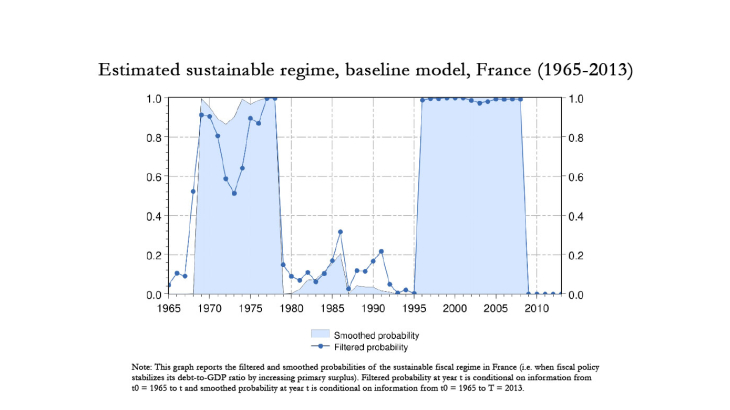Fiscal policy rules describing the reaction of primary balance to the initial level of public debt have long been used to analyze fiscal sustainability. According to Bohn's seminal contribution (1998, QJE), primary public balance must increase after an increase of the public debt-to-GDP ratio to ensure sustainability, as defined by the respect of the government intertemporal budget constraint. This paper is motivated by the empirical evidence of fiscal episodes during which public debt-to-GDP is non-stationary and generates no improvement in primary public balance. Under these episodes, fiscal policy periodically violates Bohn's sustainability condition and thus raises critical questions on the long-run fiscal sustainability: is a periodically unsustainable fiscal policy a threat to long-run sustainability of public finance? How long can fiscal policy be periodically unsustainable without violating its sustainability constraints in the long-run?
The paper introduces a Regime-Switching Model-Based Sustainability (RS-MBS) test for fiscal policy, building on Bohn's Model-Based Sustainability (MBS) framework and on the literature on Markov-switching fiscal policy rules. Bohn’s MBS approach relies on two key ingredients: an equilibrium demand for public bonds (i.e. the Euler equation) that pins down the stochastic discount factor and a behavioral equation for fiscal policy (i.e. a fiscal policy rule).
In this paper, we assume a Markov-switching fiscal policy rule that stochastically switches between sustainable and unsustainable regimes. We define unsustainable regimes by periodic and persistent negative or null feedback effect of initial public debt on primary surplus, i.e. violating Bohn's sustainability condition. Consequently, the public debt-to-GDP ratio becomes periodically and persistently explosive during unsustainable regimes. We demonstrate how fiscal regimes matter for global (in opposition with local) fiscal sustainability analysis.
We consider the two usual concepts of long-run fiscal sustainability: the No-Ponzi game condition (related to the transversality condition) and the debt-stabilizing condition (related to the stationarity of the debt-to-GDP ratio). For each concept of fiscal sustainability, we derive sufficient conditions for long-run (or global) fiscal sustainability which depend on regime-specific feedback coefficients of the Markov-switching fiscal policy rule and on expected durations (or persistence) of fiscal regimes. We show that fiscal policy can be locally unsustainable, with a periodically explosive public-debt-to-GDP ratio, and still be globally sustainable.
We apply our test to France’s fiscal policy. Our empirical results are threefold.
First, we estimate different specifications of Bohn's constant parameter fiscal policy rule. These estimates do not allow rejecting unsustainability: the feedback coefficient on public debt-to-GDP is rarely positive and never significant, according to standard MBS tests.
Second, we estimate a Markov-switching fiscal policy rule. We identify two different fiscal regimes over the period: one regime is sustainable, with a strong positive and significant feedback effect of lagged public debt-to-GDP on the primary surplus-to-GDP, while the second one is unsustainable with no significant feedback effect. The existence of two fiscal regimes in France helps reconcile the contrasting results achieved in the literature where some papers conclude that fiscal policy has not been sustainable whereas some others show the opposite. In addition, identified fiscal regimes are found to be highly persistent. In particular, our findings support the view that the Maastricht Treaty and the Stability and Growth Pact (SGP) actually made France's fiscal policy more sustainable despite being under an Excessive Deficit Procedure from 2003 to 2007.
Third, we perform RS-MBS tests for No-Ponzi Game and Stationary debt-output ratio. We reject the null hypothesis of a Ponzi Scheme as well as the null of an explosive public debt-to-GDP ratio and conclude that France has achieved global sustainability since 1965, despite a prolonged period of unsustainability from the early 80s to the mid-90s.
